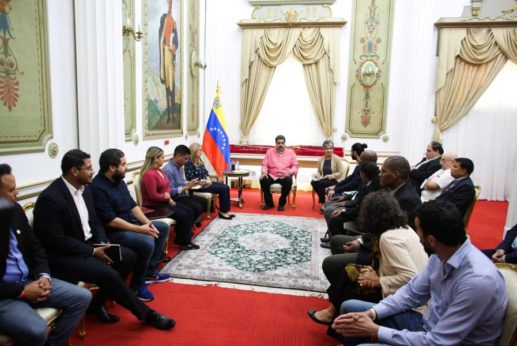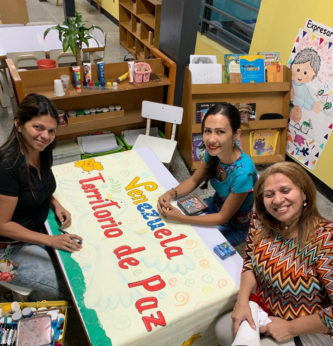
CARACAS, Venezuela—“I don’t care for Maduro as a leader, but I’m all for socialism!” This was the response I received time and time again from the so-called “opposition” to the United Socialist Party of Venezuela (PSUV) headed by Nicolás Maduro during my 14-day visit in the country last month.
I was sent to Venezuela as a delegate of the Youth of the Communist Party USA (CPUSA) to attend the General Council meeting of the World Federation of Democratic Youth (WFDY) from April 9-11. There the anti-imperialist youth of the world established a newfound solidarity with the youth organizations of the Communist Party of Venezuela (PCV) and the United Socialist Party.

From April 12-15, the delegates sent to WFDY participated in the Second Solidarity Mission with the Bolivarian Republic of Venezuela and were even invited to a private audience with President Maduro before attending a rally in front of the presidential palace in Caracas known as Miraflores. “No, we don’t have socialism at the moment,” Maduro stated in front of an audience of mostly foreign youth delegates and Venezuelan university students. “We must defeat the imperialist threat so that we can continue to construct socialism peacefully!”
The threat has been building for months. The wildest accusations are streaming out of Washington—that Venezuela is a military colony of Cuba and Russia, for example, which would presume a Monroe Doctrine-inspired response. Military intervention by the United States has specifically and loudly been declared not off the table.
As part of the Second Solidarity Mission which took place concurrently with the meeting of the World Peace Council, also meeting in Caracas for its 70th anniversary, our PCV and PSUV hosts gave us a tour of the home and mausoleum of Simón Bolívar (the liberator of South America), the tomb of Hugo Chávez, recreational centers, the Bolivarian Military University, and former military bases which have been gradually converted into massive housing complexes by the Bolivarian Revolution since 2008.
“Simón Bolívar was not a socialist, he was a liberal,” our tour guide told us. “He fought to unite all of South America under one banner for people of all colors, social classes and creeds. That’s why we, as socialists, honor the Liberator for paving the road to socialism for us.” Bolívar was born in Caracas under Spanish colonial rule and was raised by Afro-Venezuelan slaves after the untimely death of his mother and the extended absence of his aristocratic father. Bolívar went on to liberate six modern republics (Venezuela, Colombia, Panama, Peru, Bolivia, Ecuador) which during the early 19th century was known as “La Gran Colombia” before dividing up at different points in history as independent nations.
The recreational center that we were taken to in the heart of Caracas was five stories tall, with each floor dedicated to some form of entertainment or recreation. Basketball courts, libraries, computer labs, cafeterias (with free meals for children) and even breastfeeding rooms are open to the public 24 hours a day, 7 days a week. Abdiel Lamas, a representative from the Venezuelan Federation of University Students, told us that “the gyms in the recreational centers are on the same floor as the breastfeeding rooms so that Latin American machismo (misogyny) can be better combated within a family-oriented environment.” This encourages entire families to come out and enjoy the day together, especially when the country suffers an electrical attack and whole neighborhoods remain without light for hours, since each recreational center has its own generator.

Ana Karina Rote, a member of the Youth of the PSUV, accompanied the WFDY and World Peace Council delegates to the Tiuna City housing complex commonly known as the “Apartamentos Genesis” located just south of the capital city of Caracas. Rote informed us that her family was given one of these homes for only a down payment of $400. In fact, after the initial payment of $400, no money is required for monthly rent or utilities. Families who cannot pay the $400 are still permitted to move in given the low wages people are being paid in these critical times.
“This housing complex is built over a military base. Chávez was a military officer, but he understood that taking care of working people is more important than mobilizing for war.” As of July of last year, more than 9000 homes have been constructed in Tiuna City, with a plan of 15,276 more to be constructed in the years to come. “Despite the current economic crisis, our oil-rich country uses its wealth to benefit the people. What the government cannot pay for is usually covered by China, which is why we colloquially refer to some of these buildings as ‘chinos’ instead.” Each apartment building in Tiuna City has its own daycare/pre-school located on the first floor to ensure free education and free childcare for the workers’ children.
Another profound impact on my perspective came with our visit to the Bolivarian Military University, where we were greeted by army, navy, marine and medical personnel with hugs and kisses rather than salutes and stern faces. A second-year cadet by the name of Luis Llovera told me that his grandparents were communist guerrillas in the 1960s and ’70s and that their legacy inspired him to join the army in defense of the Bolivarian Revolution. “Notice that we are not an aggressive armed force. We are a defensive force ready to defend our country from imperialism and invasion if need be.”
It is the overwhelming hope of the Venezuelan people that the ruling party under Maduro’s leadership can cooperate with the other leftist parties of the Great Patriotic Pole coalition to agree upon a revolutionary exit out of the crisis. “Socialism here in Venezuela is often understood as a form of Christian charity or just social programs,” PCV member Fernando Arribas told us. “We have gold and land for agriculture! Let’s diversify the economy and aim for real existing socialism instead of social democratic reforms brought to us by Chavismo and Bolivarianism.”
It’s no surprise that the April 30th coup attempt against President Maduro’s government failed, despite an obvious economic crisis caused by internal factors—primarily the mismanagement of the oil economy—and the overwhelming external factor, U.S. imperialism.
The May Day celebrations in defense of Maduro’s presidency and the Bolivarian Revolution reminded me of a family who emigrated to the U.S. the day that I arrived back in Ohio. As we got off the plane together, the family of four asked me what to expect of their new life in the States. “We aren’t used to working on weekends, paying for health insurance and gasoline or even paying a co-pay when we go to visit the doctor,” the father, Gustavo, explained. “Our son has lived in Ohio for a few years and says there is more economic opportunity here, but less of a social and family life.”
I couldn’t help but agree with Gustavo who, despite his recent migration to the U.S., stated that he still believes in the fundamental movement for socialism in Venezuela. But what can he expect out of a country like the U.S., which refuses to honor International Workers Day as a national holiday when its origin is rooted in the 1886 Haymarket Massacre in Chicago? Certainly not the warmest of welcomes, given the current anti-immigrant sentiment force-fed to us from the Trump administration.
More U.S.-backed coups against the Bolivarian Republic of Venezuela can be expected while the violent terrorists Juan Guaidó and Leopoldo López roam freely around the country taking advantage of people earning low wages with bribes in order to put together an anti-Maduro opposition.
But what can we take away from the failed coup and the May Day celebration that followed? On April 30th, Guaidó’s thugs took to the streets armed with Molotov cocktails with support from a handful of army deserters, whereas supporters of Maduro and the Bolivarian Revolution took to the streets with flags, banners and signs on May 1st condemning U.S. intervention and its manufactured coup. There is a clear distinction between the peaceful revolutionary majority and the violent, pro-imperialist minority.
The U.S.-backed coup in Venezuela was defeated just in time for the May Day celebration!
Let’s stand in solidarity with the Venezuelan people who are entitled to self-determination!
Workers of the world, unite! Hands off Venezuela!










